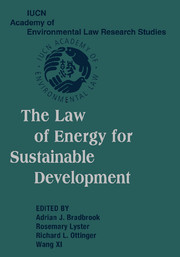Book contents
- Frontmatter
- Contents
- Acknowledgments
- Message from Kofi A. Annan, Secretary-General, United Nations
- Introduction – A Global Learned Society to Address Earth's Evolution: The IUCN Academy of Environmental Law
- Public Lectures on International Environmental Law
- PART ONE SUSTAINABLE DEVELOPMENT AND THE ROLE OF ENERGY LAW
- PART TWO LEGAL ISSUES IN CONTEMPORARY ENERGY LAW
- PART THREE INTERNATIONAL ENERGY LAW
- 11 International Law and Global Sustainable Energy Production and Consumption
- 12 Policy Options
- 13 Financing Energy for Sustainable Development
- 14 The Clean Development Mechanism and UNFCCC / Kyoto Protocol Developments
- 15 The Report of the World Commission on Dams: Some Implications for Energy Law
- 16 International Issues for Sustainable Development: IUCN Perspective
- 17 Enhanced Implementation and Enforcement of International Environmental Laws by the Judiciary
- PART FOUR COMPARATIVE ENERGY LAW
- PART FIVE ELECTRICITY RESTRUCTURING
- PART SIX FINANCING FOR SUSTAINABLE ENERGY
- PART SEVEN CIVIL SOCIETY AND THE PROCEDURAL REQUIREMENTS OF ENERGY LAW FOR SUSTAINABLE DEVELOPMENT
- Index
15 - The Report of the World Commission on Dams: Some Implications for Energy Law
Published online by Cambridge University Press: 10 August 2009
- Frontmatter
- Contents
- Acknowledgments
- Message from Kofi A. Annan, Secretary-General, United Nations
- Introduction – A Global Learned Society to Address Earth's Evolution: The IUCN Academy of Environmental Law
- Public Lectures on International Environmental Law
- PART ONE SUSTAINABLE DEVELOPMENT AND THE ROLE OF ENERGY LAW
- PART TWO LEGAL ISSUES IN CONTEMPORARY ENERGY LAW
- PART THREE INTERNATIONAL ENERGY LAW
- 11 International Law and Global Sustainable Energy Production and Consumption
- 12 Policy Options
- 13 Financing Energy for Sustainable Development
- 14 The Clean Development Mechanism and UNFCCC / Kyoto Protocol Developments
- 15 The Report of the World Commission on Dams: Some Implications for Energy Law
- 16 International Issues for Sustainable Development: IUCN Perspective
- 17 Enhanced Implementation and Enforcement of International Environmental Laws by the Judiciary
- PART FOUR COMPARATIVE ENERGY LAW
- PART FIVE ELECTRICITY RESTRUCTURING
- PART SIX FINANCING FOR SUSTAINABLE ENERGY
- PART SEVEN CIVIL SOCIETY AND THE PROCEDURAL REQUIREMENTS OF ENERGY LAW FOR SUSTAINABLE DEVELOPMENT
- Index
Summary
INTRODUCTION
Among the international commissions reporting so far this millennium on water and energy development issues, the World Commission on Dams (WCD) through its report, “Dams and Development: A New Framework for Decision Making,” has issued perhaps the clearest and most comprehensive call to action for the legal fraternity and law making constituencies in this field. The WCD report refers to itself as a milestone in the evolution of dams as a development option. Observers have characterized the multistakeholder processes that gave birth to the Commission, and around which it deliberated and produced its recommendations, as a watershed in global governance – one that also serves as a model for other resource development fields.
As agreed from the outset, the Commission dissolved itself when it submitted its final report to the international community in London in November 2000. Through its findings and recommendations the Commission explicitly called for the inclusion of a number of key principles in the growing body of national legislation, laws and, regulatory frameworks for water and energy development, and for these to be reflected in international approaches. It felt the framework and principles that it offered would not only go a long way to respond to the controversy over large dams, as one option for water management and energy supply, but would markedly improve decision making processes and outcomes.
- Type
- Chapter
- Information
- The Law of Energy for Sustainable Development , pp. 237 - 254Publisher: Cambridge University PressPrint publication year: 2005



